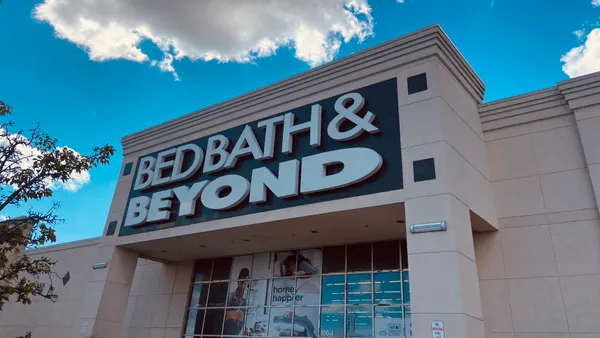Dive Brief:
-
Walmart has applied for two U.S. patents that together potentially would allow consumers to use virtual reality equipment to browse for, handle and purchase Walmart merchandise in a VR setting, as well allow fulfillment center robots to retrieve their purchases for shipping, according a CB Insights analysis of the patent filings published late last week.
-
Walmart filed for the patents last January, and both filings were published on Aug. 16. They are titled "Virtual Retail Showroom System," and "System and Methods for a Virtual Reality Showroom With Autonomous Storage and Retrieval."
-
The first patent filing covers a system that would include a "virtual reality headset including inertial sensors," which would be capable of detecting a physical object that has been rendered in 3D, along with user gestures intended to interact with the object. The second mentions how a computing system could instruct an "autonomous robot device" to retrieve the item purchased.
Dive Insight:
It's been about six months since Walmart's Store No. 8 innovation wing acquired virtual reality technology start-up Spatialand, raising questions as to what Walmart's virtual reality strategy is. Will it acquire other start-ups to match with Spatialand? Will it use VR technology in stores, online, on mobile, just for staff training, or all of the above?
The publication of these two patents doesn't give us all of the answers, and it may not even go a long way toward giving us a glimpse of Walmart's strategic path for VR technology. That's the nature of patent filings — they can be highly speculative.
Having said that, these filings show that VR is very much on Walmart's mind, as well as that some in the company are envisioning a possible future in which VR becomes the basis for the entire shopping experience. That might prove enticing to anyone who has ever spent far longer in a Walmart store than they planned, roaming the canyon-like aisles trying to find something.
The technology also is very much on the mind of Walmart's competitors and the retail sector at large. For example, Amazon is already pursuing its own patent for a "blended reality" system that could be used to enhance the shopping experience, and Wayfair and others are working to develop "mixed reality" shopping experiences. A slew of augmented reality mobile apps also points to how similar technologies are starting to gain a foothold in the sector.
Still, a VR-enabled shopping experience could shake the store foundations of a brick-and-mortar giant like Walmart if the company isn't prepared to keep up with competitors' innovations. The company likely has a long time to prepare for that possibility, though. VR technology remains expensive, especially for consumers, and retailers still have a lot of study ahead of them to figure out the use cases that will work best for them.













